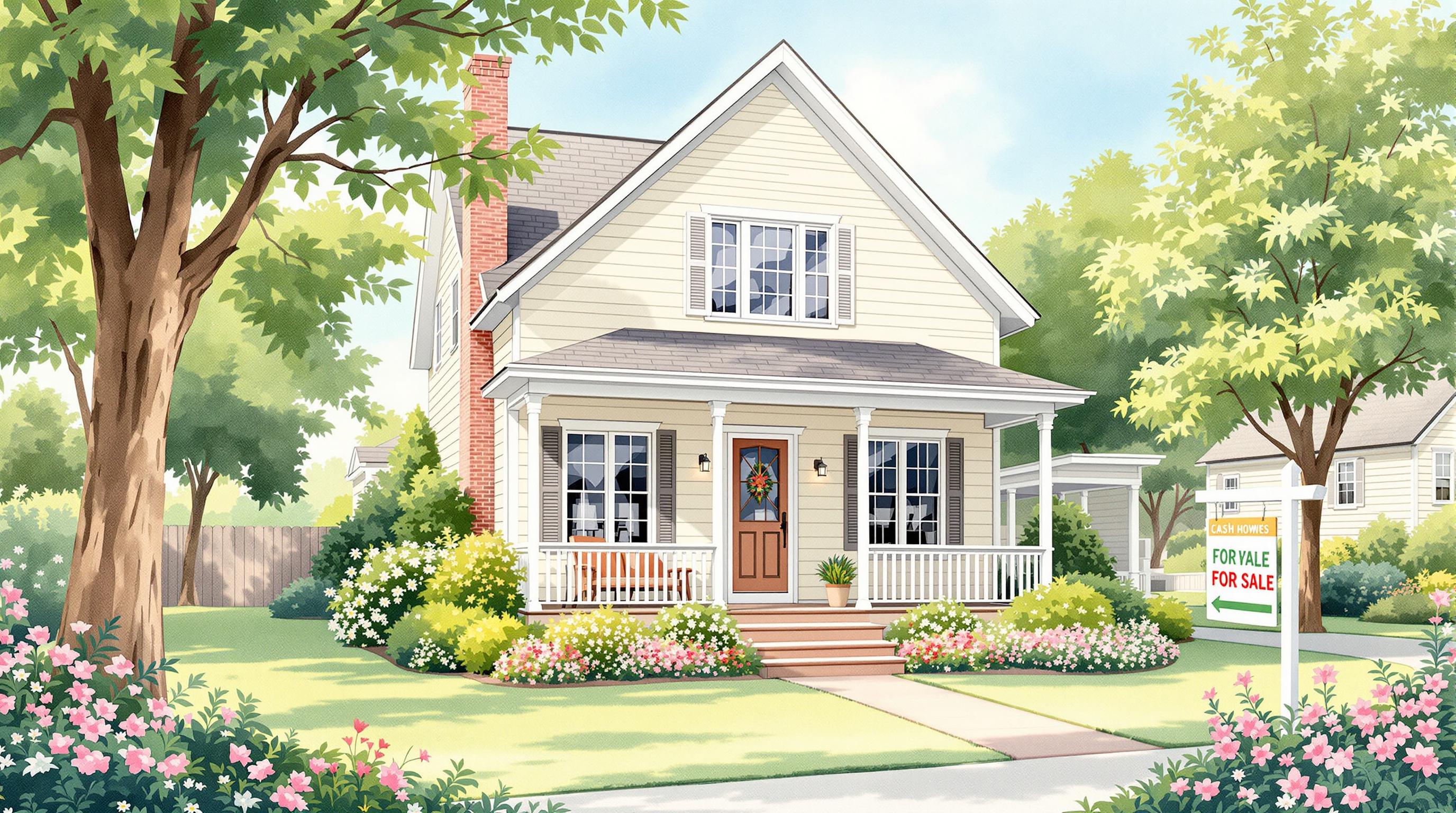Harrisburg is becoming a hotspot for real estate investors, thanks to its affordability and growth potential. Here’s why it’s worth considering:
- Affordable Entry Point: Median home prices in Harrisburg are $165,000 - 61% below the national median.
- Strong Growth: Home values rose 21.3% last year, with Zillow predicting a 3.4% increase by the end of 2025.
- Rental Demand: Average rents are $1,370, with a 96.4% occupancy rate for long-term rentals and promising returns for short-term rentals.
- Diverse Opportunities: From single-family homes to multi-family units and short-term rentals, Harrisburg offers options for all investment strategies.
- Key Neighborhoods: Midtown, Uptown, Allison Hill, Shipoke, and Middletown stand out for their unique investment advantages.
With its proximity to major cities, a growing job market, and a stable rental demand, Harrisburg offers investors a low-cost, high-potential market. Whether you're a first-time buyer or an experienced investor, the city provides opportunities for steady income and property appreciation.
Harrisburg Real Estate Market Overview
Current Market Data and Trends
The Harrisburg real estate market is sending mixed signals when it comes to pricing. According to recent data, Zillow reports an average home value of $260,516, reflecting a 3.6% increase, while Redfin lists the median price at $145,000, marking a 11.6% decline. Meanwhile, local reports show a median price of $165,000, which is up by 21.3%.
Looking deeper into Redfin's numbers, the median sale price per square foot in Harrisburg has risen to $111, showing a 6.2% year-over-year increase. Homes are selling fast, with properties typically moving to pending status in just 6 days as of June 30, 2025.
Inventory is another key factor shaping the market. June 2025 recorded the highest inventory levels in five years, with 375 properties for sale, including 196 new listings. The activity isn’t isolated to Harrisburg alone - listings across Central Pennsylvania also reflect a vibrant market.
"As we head into the 2nd half of 2025, the real estate market in Central PA remains strong." - Jimmy Koury, 2025 GHAR President
The rental market, on the other hand, highlights the income potential for investors. The average rent across all property types is $1,395 per month, an increase of $95 over the past year, equating to a 2.6% annual growth rate. These numbers suggest a steady demand for rental properties, further reinforcing the market's appeal.
Why Harrisburg Appeals to Investors
Harrisburg stands out as an attractive market for investors, largely due to its affordability compared to national averages. Median home prices in the area are 58% to 61% lower than the national median, making it a low-cost entry point with high potential demand.
While the average rent of $1,395 is 26% to 34% lower than the national average, this affordability helps maintain a consistent pool of tenants. Rental opportunities in Harrisburg are diverse, with monthly rents ranging from $750 to $6,000, catering to a wide spectrum of renters.
The market's recent momentum - marked by rising inventory and steady buyer interest - showcases Harrisburg’s strong fundamentals. For savvy investors, these factors create an environment ripe with opportunity.
The 4 Criteria I Use When Selecting The Best Investment Property
Types of Investment Properties in Harrisburg
Understanding the types of properties available in Harrisburg is essential for shaping your investment strategy. The choice you make will depend on your budget, how you plan to manage the property, and the kind of income you aim to generate. Each property type has its own set of benefits and challenges, which directly influence your potential returns and everyday responsibilities.
Single-Family Homes
Single-family homes are often the go-to option for first-time investors in Harrisburg. These standalone properties are relatively easy to manage and come with simpler financing options, making them an attractive choice for beginners. However, one key drawback is that vacancies can completely halt your rental income. On the brighter side, single-family homes tend to build equity faster, especially in neighborhoods experiencing growth where homeownership is highly valued.
Multi-Family Properties
Multi-family properties, such as duplexes and triplexes, provide a different investment opportunity centered on generating multiple income streams. With several units under one roof, these properties reduce the financial impact of a single vacancy, offering more stable cash flow. They also allow for quicker portfolio expansion compared to acquiring multiple single-family homes, as shared maintenance costs across units can improve efficiency. That said, managing multi-family properties can be more demanding. You’ll need to juggle multiple tenants, leases, and potentially more complex financing. Still, for those looking to scale their investments, this option aligns well with Harrisburg's growing demand for diverse housing solutions.
Short-Term vs. Long-Term Rentals
Your choice between short-term and long-term rentals will shape both your income potential and the level of effort required to manage the property. Harrisburg’s market offers strong opportunities for both approaches.
Short-term rentals, such as those listed on Airbnb, have shown promising returns. On average, these properties are booked for 226 nights annually, with a median occupancy rate of 62% and an average daily rate of $107. In 2023, typical short-term rental hosts in Harrisburg earned approximately $23,000, with July being the most lucrative month. However, this strategy requires significant effort, including constant marketing, guest communication, cleaning, and quick maintenance responses. While short-term rentals can nearly double the cash flow compared to long-term leases, they demand a hands-on management style.
On the other hand, long-term rentals provide steady and predictable income with significantly less daily involvement. Harrisburg’s long-term rental market is strong, boasting a 96.4% occupancy rate last year, which outpaces the national average of 94%. With long-term leases, you benefit from lower tenant turnover, thorough screening processes, and predictable maintenance schedules, all of which contribute to consistent monthly revenue.
| Factor | Short-Term Rentals | Long-Term Rentals |
|---|---|---|
| Income Potential | Higher monthly cash flow | Steady monthly income |
| Management Level | High - requires daily effort | Lower - monthly involvement |
| Occupancy Rate | 62% median | 96.4% |
| Flexibility | Allows personal use | Fixed lease terms |
Selecting the right rental strategy depends on your goals and how much time you’re willing to dedicate to property management. Harrisburg’s market trends support both options, so weigh your priorities carefully to align with your broader investment plans.
Best Neighborhoods for Investment in Harrisburg
Choosing the right neighborhood can significantly impact your rental income, tenant quality, and property appreciation. Harrisburg offers a range of areas, each with unique advantages suited to different investment strategies.
Top Investment Neighborhoods
Midtown Harrisburg stands out with its lively arts scene and proximity to downtown, making it a magnet for creative professionals and growing businesses. Its walkable streets and the arrival of new businesses make it a strong choice for those interested in retail or office properties.
Uptown Harrisburg is ideal for investors seeking affordable entry points. With relatively low property prices and a growing demand for local services, this area is gaining traction for commercial real estate. Ongoing revitalization efforts by the local government add to its appeal, offering potential for significant equity growth. It’s a great spot for businesses looking to establish themselves in an up-and-coming community.
Allison Hill is perfect for value-add strategies. Known for its budget-friendly real estate prices, the neighborhood is undergoing renewal projects. This makes it a good option for house flipping or catering to Section 8 tenants, where the low cost of acquisition can lead to strong returns.
Shipoke caters to high-income tenants with its upscale charm and established character. These qualities allow landlords to command premium rental rates.
Middletown is a prime location for short-term rental investors. This waterfront area, with its dining and entertainment options, appeals to vacationers. Its scenic setting and local amenities ensure consistent demand for short-term stays.
| Neighborhood | Best Investment Strategy | Key Advantage | Target Tenant |
|---|---|---|---|
| Midtown | Retail/Office Properties | Thriving arts & culture scene | Creative professionals |
| Uptown | Affordable Commercial Real Estate | Low property costs | Growing businesses |
| Allison Hill | Fix-and-Flip/Section 8 | Budget-friendly prices | Budget-conscious renters |
| Shipoke | Premium Rentals | Upscale environment | High-income tenants |
| Middletown | Short-Term Rentals | Waterfront amenities | Vacation guests |
These neighborhood insights can help guide your investment strategy, but further research is crucial to maximize your returns.
Research Tools for Neighborhood Analysis
To validate your investment choices, use research tools that align with Harrisburg's dynamic market trends.
Start by analyzing vacancy rates, pricing trends, and rental demand to pinpoint areas with strong value potential. Harrisburg ranks #8 among U.S. small rental markets, with 11 renters competing for each available unit. Property prices range from $750 to $6,000, offering options for a variety of budgets.
Dive into economic and demographic data to find neighborhoods with stable rental demand. Places supported by diverse industries, major employers, and low unemployment rates tend to maintain consistent demand. Keep an eye on population growth, migration patterns, and the influx of young professionals and families.
Look into infrastructure and development projects to identify future growth opportunities. Improvements in transportation, new commercial developments, and public investments in schools and parks can significantly enhance property values. Also, assess neighborhood quality indicators like crime rates, school performance, walkability, and proximity to major job hubs to ensure steady tenant interest.
Lastly, factor in property tax rates. Lower taxes can help protect your profits, and neighborhoods with steady economic growth often offer better job opportunities and stronger median incomes.
sbb-itb-7fa5722
How to Evaluate and Finance Investment Properties
Making informed decisions in real estate investing starts with a solid evaluation of the property and choosing the right financing strategy. In Harrisburg's competitive market, understanding key metrics and funding options is crucial to ensure strong returns.
Property Evaluation Criteria
One of the most important tools for assessing profitability is the price-to-rent ratio. For example, with Harrisburg's median sale price at $145,000 in May 2025 and an average rent of $1,370 in June 2025, this metric can help you estimate how quickly rental income will offset your costs. However, recent market shifts - ranging from a 21.3% increase to an 11.6% decline - highlight the importance of timing your purchase wisely .
Harrisburg's real estate market also shows signs of strong demand. Properties are selling quickly, often above list price, which reflects a healthy rental market and the potential for property appreciation . Looking ahead, Zillow predicts a 3.4% rise in home values in the area by the end of 2025. With a median sale price that's 61% lower than the national average, Harrisburg remains an appealing option for investors.
"Harrisburg is a city that can be overlooked... The city presents a unique opportunity for real estate investors. With its affordable housing market, revitalized economy, and strategic location, the city offers substantial growth potential and attractive returns on investment." - Avrom Smith, Founder of HAS Holdings LLC
Environmental risks are another factor to consider. In Harrisburg, 44% of properties face a high risk of flooding over the next 30 years, 93% are at moderate risk of severe wind events, and 99% face significant heat risks. These challenges should be factored into your insurance and maintenance budgets to avoid unexpected costs.
Additionally, Harrisburg's growing population and strong economy make it an attractive market for rental properties. Investigate local job market trends and major employers to ensure you're targeting areas with steady tenant demand.
Once you’ve evaluated the market and chosen a property, the next step is selecting a financing option that aligns with your investment goals.
Financing Options for Investors
Choosing the right financing strategy is just as important as selecting the right property. Options like conventional mortgages, DSCR loans, hard money loans, and home equity-based loans can be tailored to your specific needs.
Conventional mortgages are the most common choice for investment properties. These loans typically require a down payment of 15% to 25% and carry interest rates that are 0.5% to 0.75% higher than those for primary residences. Lenders often consider 75% of the expected rental income when assessing your eligibility.
DSCR (Debt Service Coverage Ratio) loans are another option, particularly for investors with multiple properties. These loans focus on the property’s rental income rather than your personal earnings. A DSCR of 0.8 or higher is generally required to qualify .
For short-term projects like house flipping, hard money loans provide quick funding. While they come with higher interest rates, they’re ideal for investments that promise a fast turnaround.
If you have equity in your primary residence, home equity loans and HELOCs can be great tools. These options often come with lower interest rates and flexible terms, making them appealing for experienced investors.
| Financing Option | Down Payment | Best For | Key Advantage |
|---|---|---|---|
| Conventional Mortgage | 15-25% | Long-term rentals | Lower interest rates |
| DSCR Loan | 20-25% | Multiple properties | Qualification based on property income |
| Hard Money Loan | 10-15% | Fix-and-flip projects | Quick funding |
| Home Equity Loan/HELOC | Varies | Experienced investors | Lower rates with existing equity |
For self-employed investors, bank statement loans offer a flexible alternative. These loans rely on personal or business bank statements instead of traditional income verification, making them a practical choice for freelancers and entrepreneurs.
The key is to match your financing option to your financial situation and investment strategy. By aligning your funding choice with your goals, you can set yourself up for success in Harrisburg's dynamic real estate market.
Tools and Resources for Harrisburg Investors
To make informed decisions and protect your investments, having the right tools and expert guidance is essential. Harrisburg investors have access to a variety of resources that provide market data, property listings, and professional support to simplify the investment process.
Property Listings and Market Analysis Tools
Accessing reliable platforms for property listings and market data is the first step in finding quality investment opportunities. A top local commercial real estate platform offers robust search tools tailored to commercial properties. For residential investments, local platforms provide detailed property insights and updates on market trends, making it easier to identify promising opportunities.
Market analysis reports are another valuable resource for understanding Harrisburg's real estate landscape. For example, Property Records of Pennsylvania delivers detailed reports on ownership, property value, title transfers, and neighborhood statistics, all of which are critical for informed decision-making.
"Understanding local trends, neighborhood dynamics, and economic indicators helps you pinpoint attractive opportunities before others do, giving you an edge in any real estate market." - J. Scott Digital
When evaluating potential investments, focus on key metrics that indicate market strength and compare similar properties to ensure you're securing a competitive deal. Interestingly, only 5% of real estate companies employ a dedicated data strategy, giving investors who leverage data a significant advantage.
Understanding Harrisburg's zoning classifications is equally important. The city features a mix of downtown commercial districts, industrial zones, and mixed-use areas, offering diverse opportunities. Additionally, modern amenities like smart building systems and high-speed connectivity in Class A properties are becoming increasingly important for both property valuation and tenant demand.
To complement these tools, local experts can provide invaluable support for your investment decisions.
Central PA Realty Services for Investors

In addition to leveraging market data, working with experienced professionals like Central PA Realty can give you a strategic edge. Specializing in real estate across Central Pennsylvania, Central PA Realty offers a range of services to assist investors in counties such as Cumberland, Dauphin, Lancaster, Lebanon, and York.
One standout feature of their service is the ability to make immediate cash offers on properties. This is particularly useful for investors who need to close deals quickly or liquidate assets without the delays associated with traditional financing.
Beyond transactions, Central PA Realty's deep knowledge of Harrisburg's neighborhoods, pricing trends, and investment potential makes them a valuable partner. Their expertise helps investors identify properties with strong rental demand and long-term appreciation potential.
Take the example of Jim Thompson from Mechanicsburg, PA. Using KCA Central PA's services, he successfully purchased his first investment property and quickly closed on a second deal. The combination of real estate buying assistance and business consultation significantly accelerated his progress.
Central PA Realty also supports investors by assisting with property preparation and repairs, ensuring homes are ready for rental or resale. Their efficient closing process reduces administrative hassle, allowing investors to focus on growing their portfolios.
Conclusion
Harrisburg stands out as a promising market for real estate investment, offering a combination of affordability and growth. With property prices sitting 61% below the national median and the market showing steady upward momentum, it presents a compelling opportunity for investors looking for value and long-term returns.
What adds to Harrisburg's appeal is its prime location. The city provides access to urban conveniences at a fraction of the cost, while major employers like Hersheypark, The Pennsylvania State University, and Harrisburg University of Science and Technology ensure a strong and stable job market. This, in turn, supports consistent rental demand, making it an attractive option for those seeking reliable tenants.
For investors aiming to make the most of Harrisburg's potential, Central PA Realty offers invaluable local expertise. Their in-depth knowledge of neighborhood dynamics, pricing trends, and investment opportunities is paired with services like immediate cash offers, streamlined closing processes, and free consultations across Cumberland, Dauphin, Lancaster, Lebanon, and York counties. This personalized approach ensures investors have the support they need to secure profitable deals in this dynamic market.
FAQs
What should I consider when deciding between single-family and multi-family investment properties in Harrisburg?
When deciding between single-family and multi-family properties, it’s essential to weigh your budget, investment goals, and management style. Single-family homes are often a more accessible starting point for new investors, as they tend to require less initial capital and are simpler to manage. That said, they come with a higher vacancy risk since the entire property depends on a single tenant.
Multi-family properties, by contrast, can provide stronger cash flow because multiple units generate income at the same time. They also benefit from economies of scale, which can make certain costs more efficient. However, these properties typically demand a larger upfront investment and involve more active management responsibilities. Your choice should reflect your financial situation, long-term objectives, and comfort level with overseeing property upkeep and tenant interactions.
What steps can investors take to assess environmental risks when buying real estate in Harrisburg?
Before diving into a property investment, it's wise to start with a thorough review of flood zone maps, natural hazard information, and any available environmental reports. These resources can reveal risks like flooding or other natural threats. Additionally, take note of potential contamination concerns, such as nearby industrial sites, and evaluate the property's proximity to protected areas like open spaces or wetlands.
To gain a clearer picture, you might want to bring in professionals for environmental inspections and tap into local risk assessment tools. These measures can uncover hazards that could affect the property's value, safety, or the long-term success of your investment.
What are the best financing options for first-time investors buying property in Harrisburg?
First-time real estate investors in Harrisburg have a variety of financing options to explore. One popular choice is FHA loans, which are appealing because they require lower down payments, making homeownership more attainable for those just starting out.
Another route to consider is hard money loans, ideal for situations where quick funding is needed. These loans can be especially useful for properties that require renovations or fast action in a competitive market.
Local lenders in Harrisburg also cater to investors with rental property loans designed specifically for the area. These loans often come with terms tailored to the local market, providing an option worth exploring. Take the time to compare rates and requirements to ensure the financing aligns with your investment strategy.



